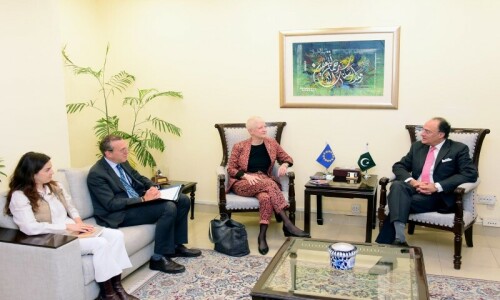More than 40m Pakistanis defecate openly: Unicef

ISLAMABAD: More than 40 million people in Pakistan do not have access to a toilet, forcing them to defecate in the open, which in turn is a major contributor to stunting in the country, a top Unicef official said.
“There are 41 million people who do not have access to a toilet in Pakistan and as a result they are defecating in the open. And open defecation has significant health and nutritional consequences,” said Geeta Rao Gupta, deputy executive director at Unicef.
She recently spoke to the AP during a trip to Pakistan to draw attention to the problem.
“Open defecation is a major contributor to stunting and that's why we've got to do all we can to stop it,” she said. The problem can spread disease and lead to intestinal infections, which can contribute to stunting in young children, she said.
Stunting means children don't grow as tall as they would otherwise, and it can also affect a child's brain development. Stunted children are more at risk of disease, don't do as well in school and stunted mothers can also give birth to stunted children.
Pakistan is the third-largest country when it comes to people going to the bathroom in the open, behind India and Indonesia.
Unicef is working with the Pakistani government to improve sanitation by doing things like encouraging people to wash their hands more often.
They're also working with communities to help them build toilets so they don't have to use the bathroom in a field or elsewhere.
The Pakistan Approach to Total Sanitation (PATS) is a sanitation program adapted from the Community Approach to Total Sanitation by Unicef in Pakistan. PATS aims to create open defecation free (ODF) villages in Pakistan by making the practice of saying no to open defecation a social norm.
However, the situation for sanitation is still bleak: approximately 43 million Pakistanis still defecate in the open, and our Millennium Development Goal (MDG 7) of increasing access to sanitation may not be met until 2027.
Read more: ‘52pc of Pakistanis combat unsanitary conditions’
The public health implications are severe. Some three million Pakistanis face infections from waterborne diseases every year. Children are especially affected by illnesses such as diarrhoea, often caused by unsafe water and inadequate sanitation, which kills more under-fives around the world than AIDS, malaria and measles combined.
During reconstruction after the 2010 floods, NGOs built thousands of latrines and water supply schemes. But despite good intentions, many systems were unsustainable due to the lack of operation and maintenance training given to local populations.
There was a culture of subsidy in calamity-hit areas. Local authorities absolved themselves of responsibility for water and sanitation systems and instead looked to external donors. But many private water service providers refuse to cover operation and maintenance costs due to low tariffs and poor profitability.
Access to water and sanitation, a human right essential to lives and livelihoods, must be protected and fulfilled, regardless of profitability.
There is a lack of policy on water, sanitation and hygiene (WASH) in Pakistan ─ and where it exists, it tends to be poorly informed and often implemented without consulting local people.
National and provincial politicians have allocated funds to water and sanitation but in Fata, Khyber Pakhtunkhwa, rural Sindh, Punjab and Balochistan, open defecation is practised widely and using a toilet in the home is considered to be taboo.
The solution is about more than funding. As Jan Eliasson, UN deputy secretary general, said last year, we must dismantle taboos: As was the case for the word `toilets` a few years ago, it is time to incorporate `open defecation` in the political language and in diplomatic discourse.
Building more toilets is also vital for empowering women and girls and keeping them in school, Gupta said. If women have to walk long distances to find a private place to relieve themselves, they are more vulnerable and exposed to attack. They're also less likely to go to school if there are no toilets. “Having toilets is a big advantage to girls,” she said.
Read more: Stipend motivates girl students to continue education












































